Entrepreneurship Research and Practice
VerifiedAdded on 2020/10/04
|13
|4437
|440
AI Summary
The assignment is a compilation of 34 references related to entrepreneurship research and practice. The sources include academic journals, books, and online resources that provide insights into various aspects of entrepreneurship, such as corporate entrepreneurship, social entrepreneurship, and small business management. The articles cover topics like innovation, entrepreneurship education, and the impact of entrepreneurship on microfinance clients and institutions.
Contribute Materials
Your contribution can guide someone’s learning journey. Share your
documents today.

ENTREPRENUERSHIP
1
1
Secure Best Marks with AI Grader
Need help grading? Try our AI Grader for instant feedback on your assignments.
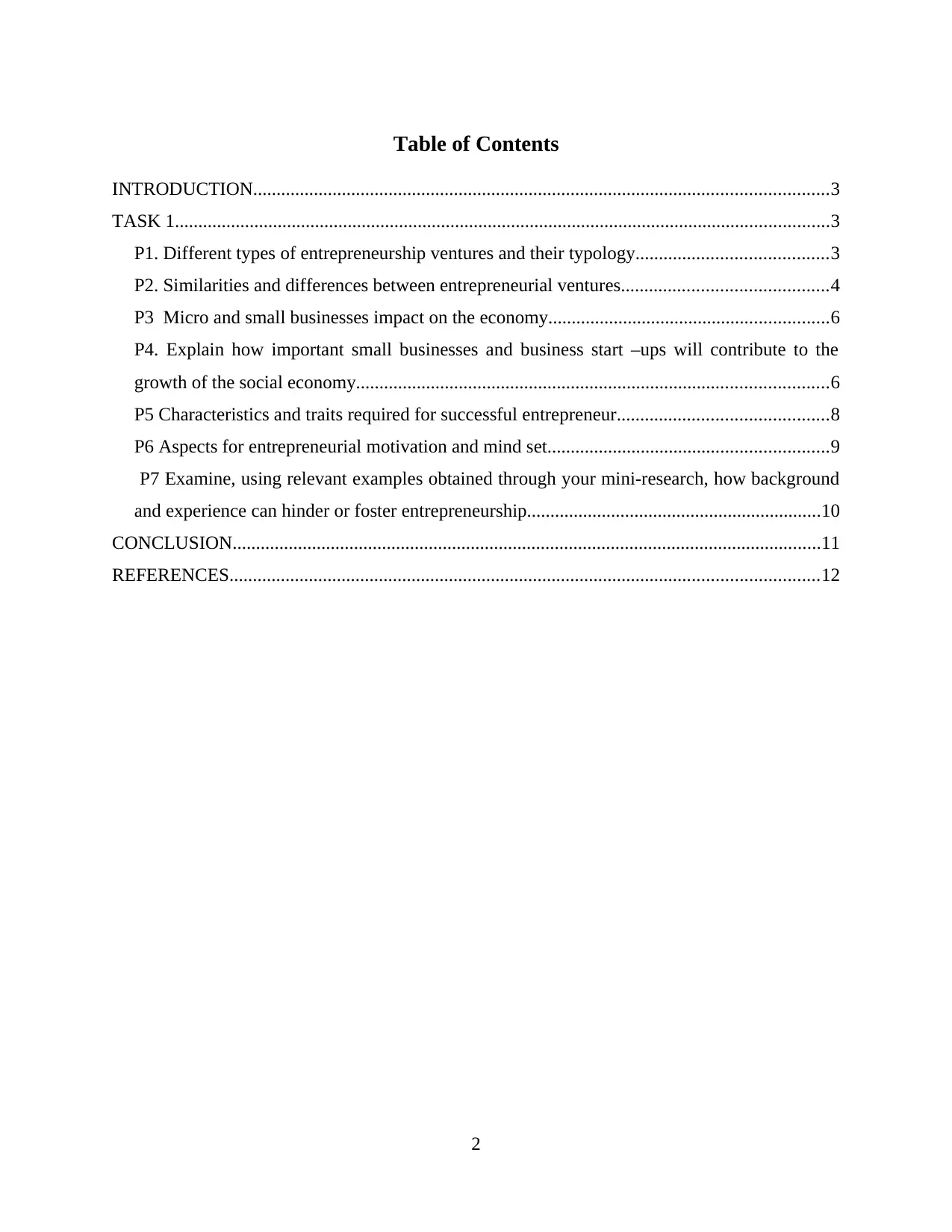
Table of Contents
INTRODUCTION...........................................................................................................................3
TASK 1............................................................................................................................................3
P1. Different types of entrepreneurship ventures and their typology.........................................3
P2. Similarities and differences between entrepreneurial ventures............................................4
P3 Micro and small businesses impact on the economy............................................................6
P4. Explain how important small businesses and business start –ups will contribute to the
growth of the social economy.....................................................................................................6
P5 Characteristics and traits required for successful entrepreneur.............................................8
P6 Aspects for entrepreneurial motivation and mind set............................................................9
P7 Examine, using relevant examples obtained through your mini-research, how background
and experience can hinder or foster entrepreneurship...............................................................10
CONCLUSION..............................................................................................................................11
REFERENCES..............................................................................................................................12
2
INTRODUCTION...........................................................................................................................3
TASK 1............................................................................................................................................3
P1. Different types of entrepreneurship ventures and their typology.........................................3
P2. Similarities and differences between entrepreneurial ventures............................................4
P3 Micro and small businesses impact on the economy............................................................6
P4. Explain how important small businesses and business start –ups will contribute to the
growth of the social economy.....................................................................................................6
P5 Characteristics and traits required for successful entrepreneur.............................................8
P6 Aspects for entrepreneurial motivation and mind set............................................................9
P7 Examine, using relevant examples obtained through your mini-research, how background
and experience can hinder or foster entrepreneurship...............................................................10
CONCLUSION..............................................................................................................................11
REFERENCES..............................................................................................................................12
2
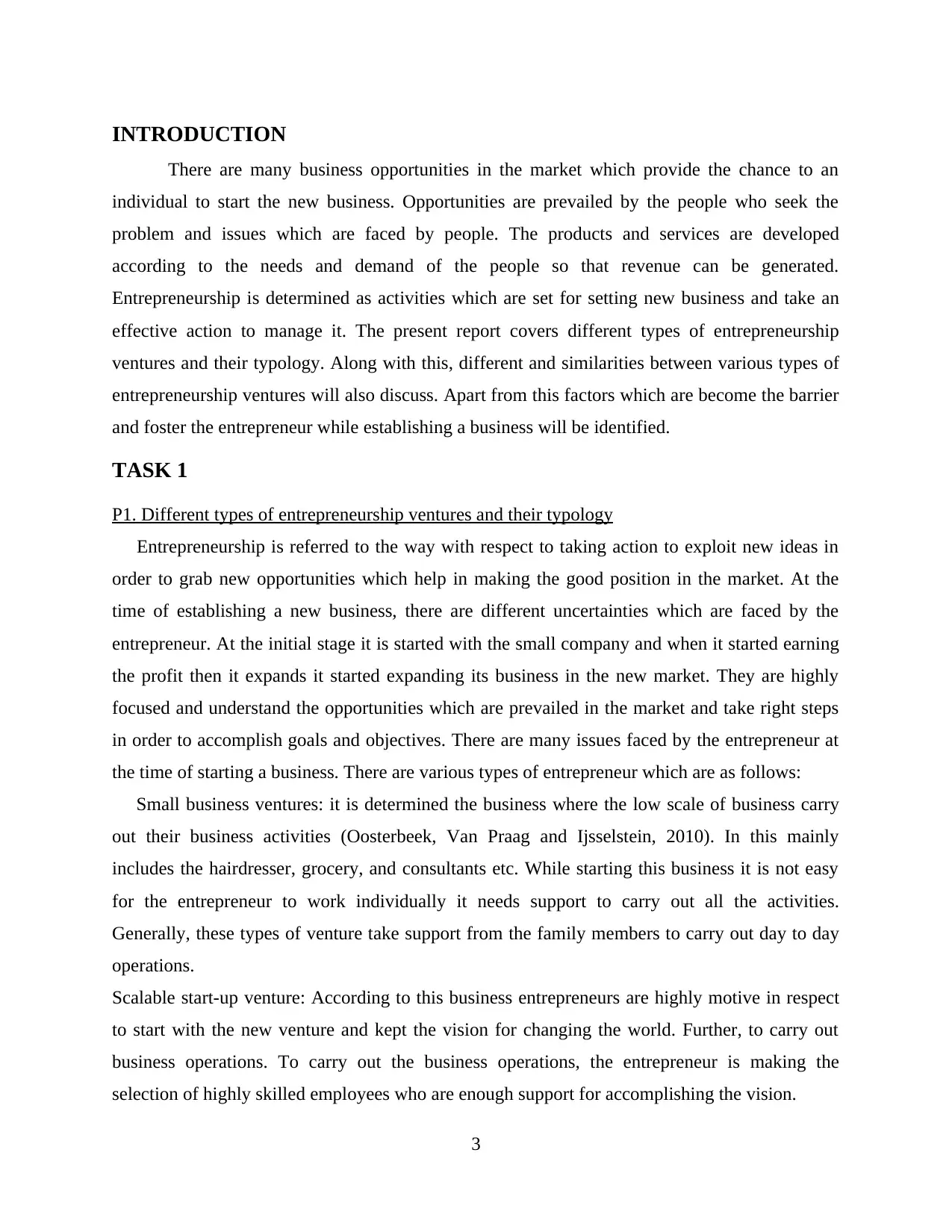
INTRODUCTION
There are many business opportunities in the market which provide the chance to an
individual to start the new business. Opportunities are prevailed by the people who seek the
problem and issues which are faced by people. The products and services are developed
according to the needs and demand of the people so that revenue can be generated.
Entrepreneurship is determined as activities which are set for setting new business and take an
effective action to manage it. The present report covers different types of entrepreneurship
ventures and their typology. Along with this, different and similarities between various types of
entrepreneurship ventures will also discuss. Apart from this factors which are become the barrier
and foster the entrepreneur while establishing a business will be identified.
TASK 1
P1. Different types of entrepreneurship ventures and their typology
Entrepreneurship is referred to the way with respect to taking action to exploit new ideas in
order to grab new opportunities which help in making the good position in the market. At the
time of establishing a new business, there are different uncertainties which are faced by the
entrepreneur. At the initial stage it is started with the small company and when it started earning
the profit then it expands it started expanding its business in the new market. They are highly
focused and understand the opportunities which are prevailed in the market and take right steps
in order to accomplish goals and objectives. There are many issues faced by the entrepreneur at
the time of starting a business. There are various types of entrepreneur which are as follows:
Small business ventures: it is determined the business where the low scale of business carry
out their business activities (Oosterbeek, Van Praag and Ijsselstein, 2010). In this mainly
includes the hairdresser, grocery, and consultants etc. While starting this business it is not easy
for the entrepreneur to work individually it needs support to carry out all the activities.
Generally, these types of venture take support from the family members to carry out day to day
operations.
Scalable start-up venture: According to this business entrepreneurs are highly motive in respect
to start with the new venture and kept the vision for changing the world. Further, to carry out
business operations. To carry out the business operations, the entrepreneur is making the
selection of highly skilled employees who are enough support for accomplishing the vision.
3
There are many business opportunities in the market which provide the chance to an
individual to start the new business. Opportunities are prevailed by the people who seek the
problem and issues which are faced by people. The products and services are developed
according to the needs and demand of the people so that revenue can be generated.
Entrepreneurship is determined as activities which are set for setting new business and take an
effective action to manage it. The present report covers different types of entrepreneurship
ventures and their typology. Along with this, different and similarities between various types of
entrepreneurship ventures will also discuss. Apart from this factors which are become the barrier
and foster the entrepreneur while establishing a business will be identified.
TASK 1
P1. Different types of entrepreneurship ventures and their typology
Entrepreneurship is referred to the way with respect to taking action to exploit new ideas in
order to grab new opportunities which help in making the good position in the market. At the
time of establishing a new business, there are different uncertainties which are faced by the
entrepreneur. At the initial stage it is started with the small company and when it started earning
the profit then it expands it started expanding its business in the new market. They are highly
focused and understand the opportunities which are prevailed in the market and take right steps
in order to accomplish goals and objectives. There are many issues faced by the entrepreneur at
the time of starting a business. There are various types of entrepreneur which are as follows:
Small business ventures: it is determined the business where the low scale of business carry
out their business activities (Oosterbeek, Van Praag and Ijsselstein, 2010). In this mainly
includes the hairdresser, grocery, and consultants etc. While starting this business it is not easy
for the entrepreneur to work individually it needs support to carry out all the activities.
Generally, these types of venture take support from the family members to carry out day to day
operations.
Scalable start-up venture: According to this business entrepreneurs are highly motive in respect
to start with the new venture and kept the vision for changing the world. Further, to carry out
business operations. To carry out the business operations, the entrepreneur is making the
selection of highly skilled employees who are enough support for accomplishing the vision.
3
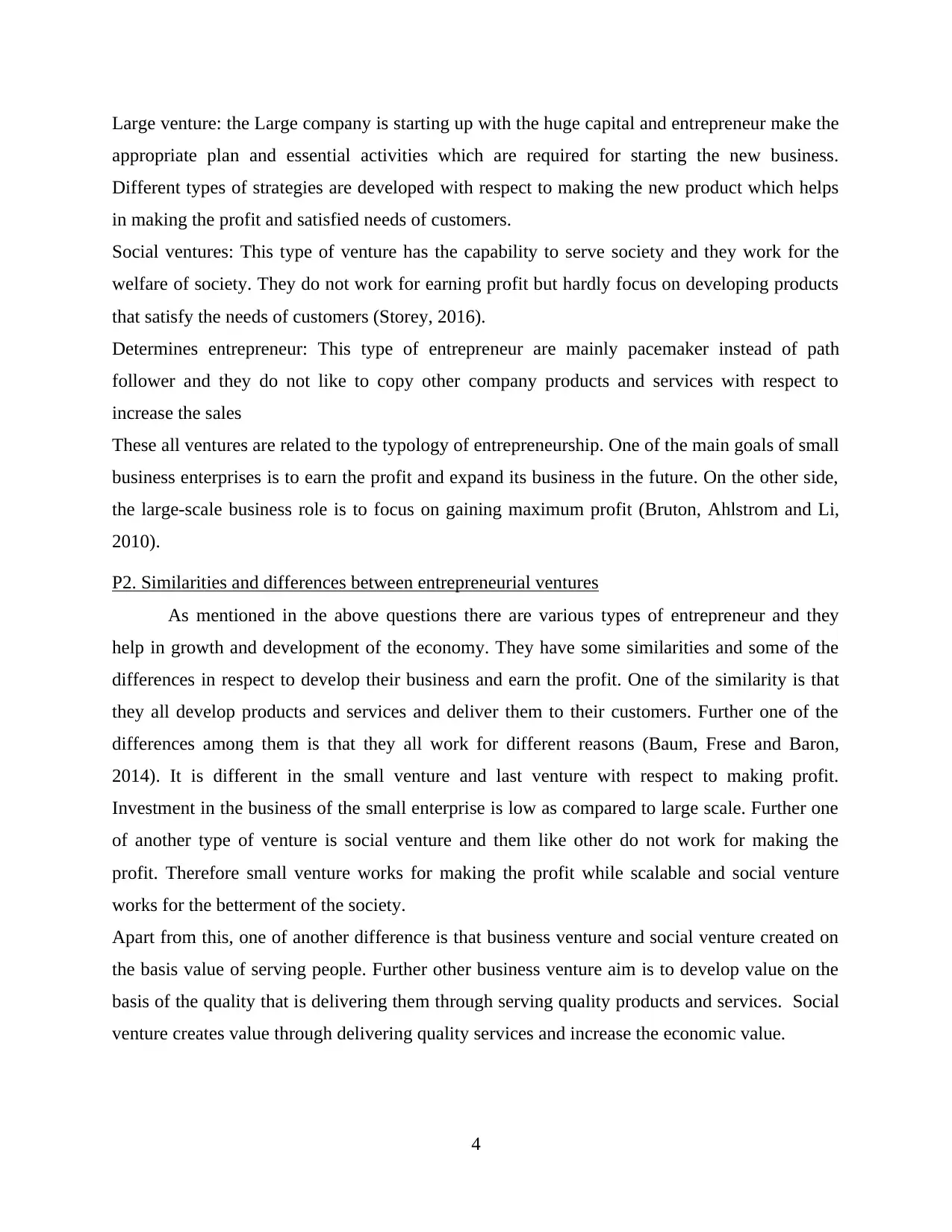
Large venture: the Large company is starting up with the huge capital and entrepreneur make the
appropriate plan and essential activities which are required for starting the new business.
Different types of strategies are developed with respect to making the new product which helps
in making the profit and satisfied needs of customers.
Social ventures: This type of venture has the capability to serve society and they work for the
welfare of society. They do not work for earning profit but hardly focus on developing products
that satisfy the needs of customers (Storey, 2016).
Determines entrepreneur: This type of entrepreneur are mainly pacemaker instead of path
follower and they do not like to copy other company products and services with respect to
increase the sales
These all ventures are related to the typology of entrepreneurship. One of the main goals of small
business enterprises is to earn the profit and expand its business in the future. On the other side,
the large-scale business role is to focus on gaining maximum profit (Bruton, Ahlstrom and Li,
2010).
P2. Similarities and differences between entrepreneurial ventures
As mentioned in the above questions there are various types of entrepreneur and they
help in growth and development of the economy. They have some similarities and some of the
differences in respect to develop their business and earn the profit. One of the similarity is that
they all develop products and services and deliver them to their customers. Further one of the
differences among them is that they all work for different reasons (Baum, Frese and Baron,
2014). It is different in the small venture and last venture with respect to making profit.
Investment in the business of the small enterprise is low as compared to large scale. Further one
of another type of venture is social venture and them like other do not work for making the
profit. Therefore small venture works for making the profit while scalable and social venture
works for the betterment of the society.
Apart from this, one of another difference is that business venture and social venture created on
the basis value of serving people. Further other business venture aim is to develop value on the
basis of the quality that is delivering them through serving quality products and services. Social
venture creates value through delivering quality services and increase the economic value.
4
appropriate plan and essential activities which are required for starting the new business.
Different types of strategies are developed with respect to making the new product which helps
in making the profit and satisfied needs of customers.
Social ventures: This type of venture has the capability to serve society and they work for the
welfare of society. They do not work for earning profit but hardly focus on developing products
that satisfy the needs of customers (Storey, 2016).
Determines entrepreneur: This type of entrepreneur are mainly pacemaker instead of path
follower and they do not like to copy other company products and services with respect to
increase the sales
These all ventures are related to the typology of entrepreneurship. One of the main goals of small
business enterprises is to earn the profit and expand its business in the future. On the other side,
the large-scale business role is to focus on gaining maximum profit (Bruton, Ahlstrom and Li,
2010).
P2. Similarities and differences between entrepreneurial ventures
As mentioned in the above questions there are various types of entrepreneur and they
help in growth and development of the economy. They have some similarities and some of the
differences in respect to develop their business and earn the profit. One of the similarity is that
they all develop products and services and deliver them to their customers. Further one of the
differences among them is that they all work for different reasons (Baum, Frese and Baron,
2014). It is different in the small venture and last venture with respect to making profit.
Investment in the business of the small enterprise is low as compared to large scale. Further one
of another type of venture is social venture and them like other do not work for making the
profit. Therefore small venture works for making the profit while scalable and social venture
works for the betterment of the society.
Apart from this, one of another difference is that business venture and social venture created on
the basis value of serving people. Further other business venture aim is to develop value on the
basis of the quality that is delivering them through serving quality products and services. Social
venture creates value through delivering quality services and increase the economic value.
4
Secure Best Marks with AI Grader
Need help grading? Try our AI Grader for instant feedback on your assignments.
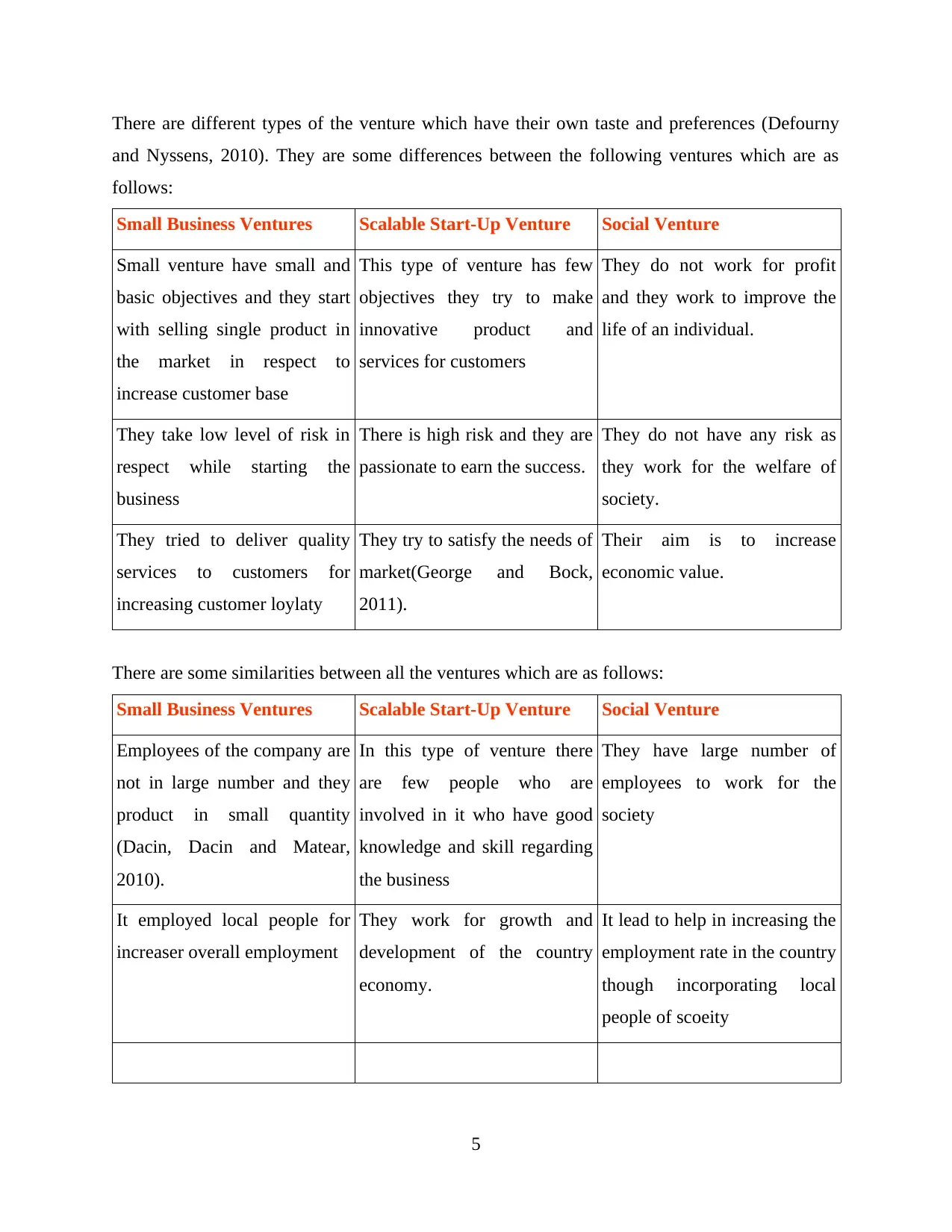
There are different types of the venture which have their own taste and preferences (Defourny
and Nyssens, 2010). They are some differences between the following ventures which are as
follows:
Small Business Ventures Scalable Start-Up Venture Social Venture
Small venture have small and
basic objectives and they start
with selling single product in
the market in respect to
increase customer base
This type of venture has few
objectives they try to make
innovative product and
services for customers
They do not work for profit
and they work to improve the
life of an individual.
They take low level of risk in
respect while starting the
business
There is high risk and they are
passionate to earn the success.
They do not have any risk as
they work for the welfare of
society.
They tried to deliver quality
services to customers for
increasing customer loylaty
They try to satisfy the needs of
market(George and Bock,
2011).
Their aim is to increase
economic value.
There are some similarities between all the ventures which are as follows:
Small Business Ventures Scalable Start-Up Venture Social Venture
Employees of the company are
not in large number and they
product in small quantity
(Dacin, Dacin and Matear,
2010).
In this type of venture there
are few people who are
involved in it who have good
knowledge and skill regarding
the business
They have large number of
employees to work for the
society
It employed local people for
increaser overall employment
They work for growth and
development of the country
economy.
It lead to help in increasing the
employment rate in the country
though incorporating local
people of scoeity
5
and Nyssens, 2010). They are some differences between the following ventures which are as
follows:
Small Business Ventures Scalable Start-Up Venture Social Venture
Small venture have small and
basic objectives and they start
with selling single product in
the market in respect to
increase customer base
This type of venture has few
objectives they try to make
innovative product and
services for customers
They do not work for profit
and they work to improve the
life of an individual.
They take low level of risk in
respect while starting the
business
There is high risk and they are
passionate to earn the success.
They do not have any risk as
they work for the welfare of
society.
They tried to deliver quality
services to customers for
increasing customer loylaty
They try to satisfy the needs of
market(George and Bock,
2011).
Their aim is to increase
economic value.
There are some similarities between all the ventures which are as follows:
Small Business Ventures Scalable Start-Up Venture Social Venture
Employees of the company are
not in large number and they
product in small quantity
(Dacin, Dacin and Matear,
2010).
In this type of venture there
are few people who are
involved in it who have good
knowledge and skill regarding
the business
They have large number of
employees to work for the
society
It employed local people for
increaser overall employment
They work for growth and
development of the country
economy.
It lead to help in increasing the
employment rate in the country
though incorporating local
people of scoeity
5
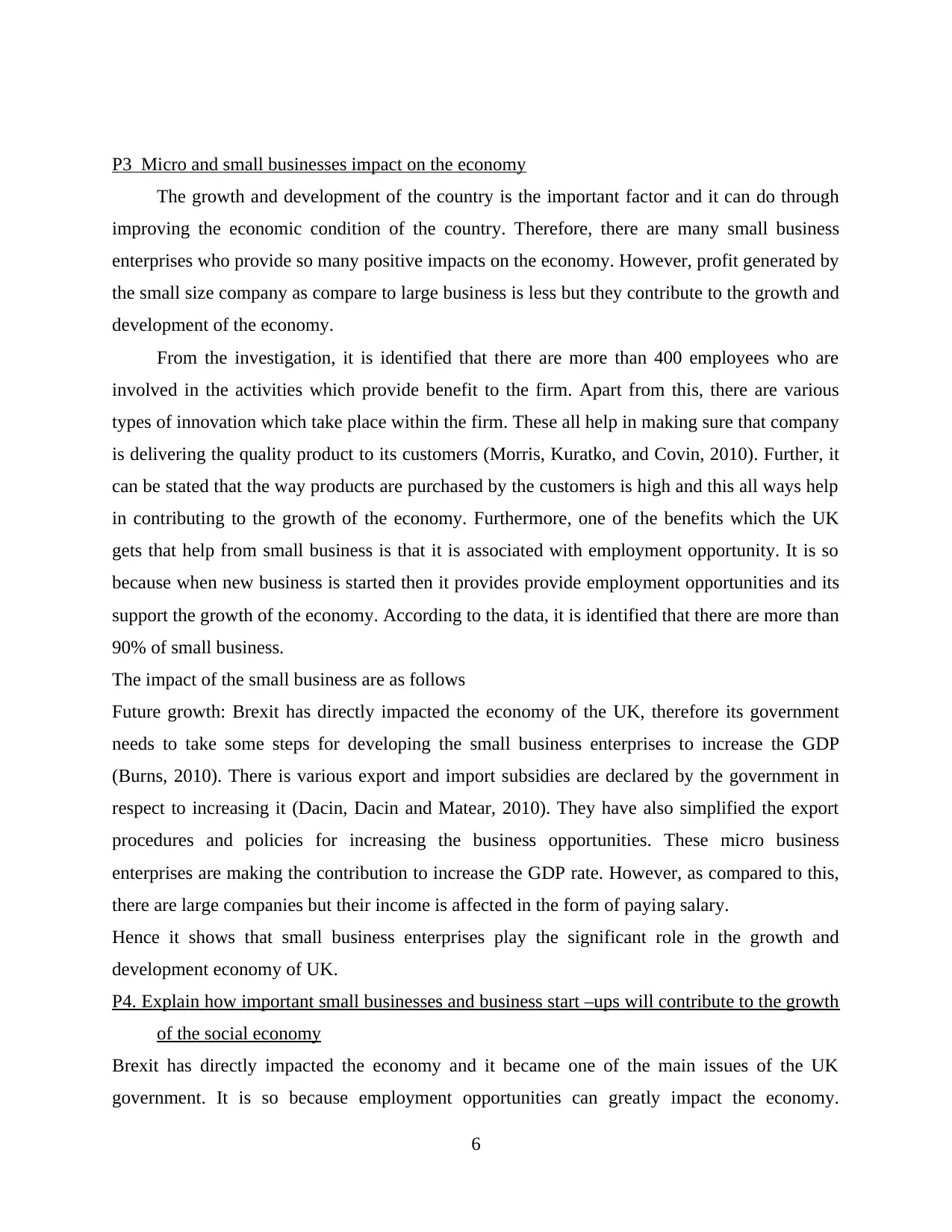
P3 Micro and small businesses impact on the economy
The growth and development of the country is the important factor and it can do through
improving the economic condition of the country. Therefore, there are many small business
enterprises who provide so many positive impacts on the economy. However, profit generated by
the small size company as compare to large business is less but they contribute to the growth and
development of the economy.
From the investigation, it is identified that there are more than 400 employees who are
involved in the activities which provide benefit to the firm. Apart from this, there are various
types of innovation which take place within the firm. These all help in making sure that company
is delivering the quality product to its customers (Morris, Kuratko, and Covin, 2010). Further, it
can be stated that the way products are purchased by the customers is high and this all ways help
in contributing to the growth of the economy. Furthermore, one of the benefits which the UK
gets that help from small business is that it is associated with employment opportunity. It is so
because when new business is started then it provides provide employment opportunities and its
support the growth of the economy. According to the data, it is identified that there are more than
90% of small business.
The impact of the small business are as follows
Future growth: Brexit has directly impacted the economy of the UK, therefore its government
needs to take some steps for developing the small business enterprises to increase the GDP
(Burns, 2010). There is various export and import subsidies are declared by the government in
respect to increasing it (Dacin, Dacin and Matear, 2010). They have also simplified the export
procedures and policies for increasing the business opportunities. These micro business
enterprises are making the contribution to increase the GDP rate. However, as compared to this,
there are large companies but their income is affected in the form of paying salary.
Hence it shows that small business enterprises play the significant role in the growth and
development economy of UK.
P4. Explain how important small businesses and business start –ups will contribute to the growth
of the social economy
Brexit has directly impacted the economy and it became one of the main issues of the UK
government. It is so because employment opportunities can greatly impact the economy.
6
The growth and development of the country is the important factor and it can do through
improving the economic condition of the country. Therefore, there are many small business
enterprises who provide so many positive impacts on the economy. However, profit generated by
the small size company as compare to large business is less but they contribute to the growth and
development of the economy.
From the investigation, it is identified that there are more than 400 employees who are
involved in the activities which provide benefit to the firm. Apart from this, there are various
types of innovation which take place within the firm. These all help in making sure that company
is delivering the quality product to its customers (Morris, Kuratko, and Covin, 2010). Further, it
can be stated that the way products are purchased by the customers is high and this all ways help
in contributing to the growth of the economy. Furthermore, one of the benefits which the UK
gets that help from small business is that it is associated with employment opportunity. It is so
because when new business is started then it provides provide employment opportunities and its
support the growth of the economy. According to the data, it is identified that there are more than
90% of small business.
The impact of the small business are as follows
Future growth: Brexit has directly impacted the economy of the UK, therefore its government
needs to take some steps for developing the small business enterprises to increase the GDP
(Burns, 2010). There is various export and import subsidies are declared by the government in
respect to increasing it (Dacin, Dacin and Matear, 2010). They have also simplified the export
procedures and policies for increasing the business opportunities. These micro business
enterprises are making the contribution to increase the GDP rate. However, as compared to this,
there are large companies but their income is affected in the form of paying salary.
Hence it shows that small business enterprises play the significant role in the growth and
development economy of UK.
P4. Explain how important small businesses and business start –ups will contribute to the growth
of the social economy
Brexit has directly impacted the economy and it became one of the main issues of the UK
government. It is so because employment opportunities can greatly impact the economy.
6
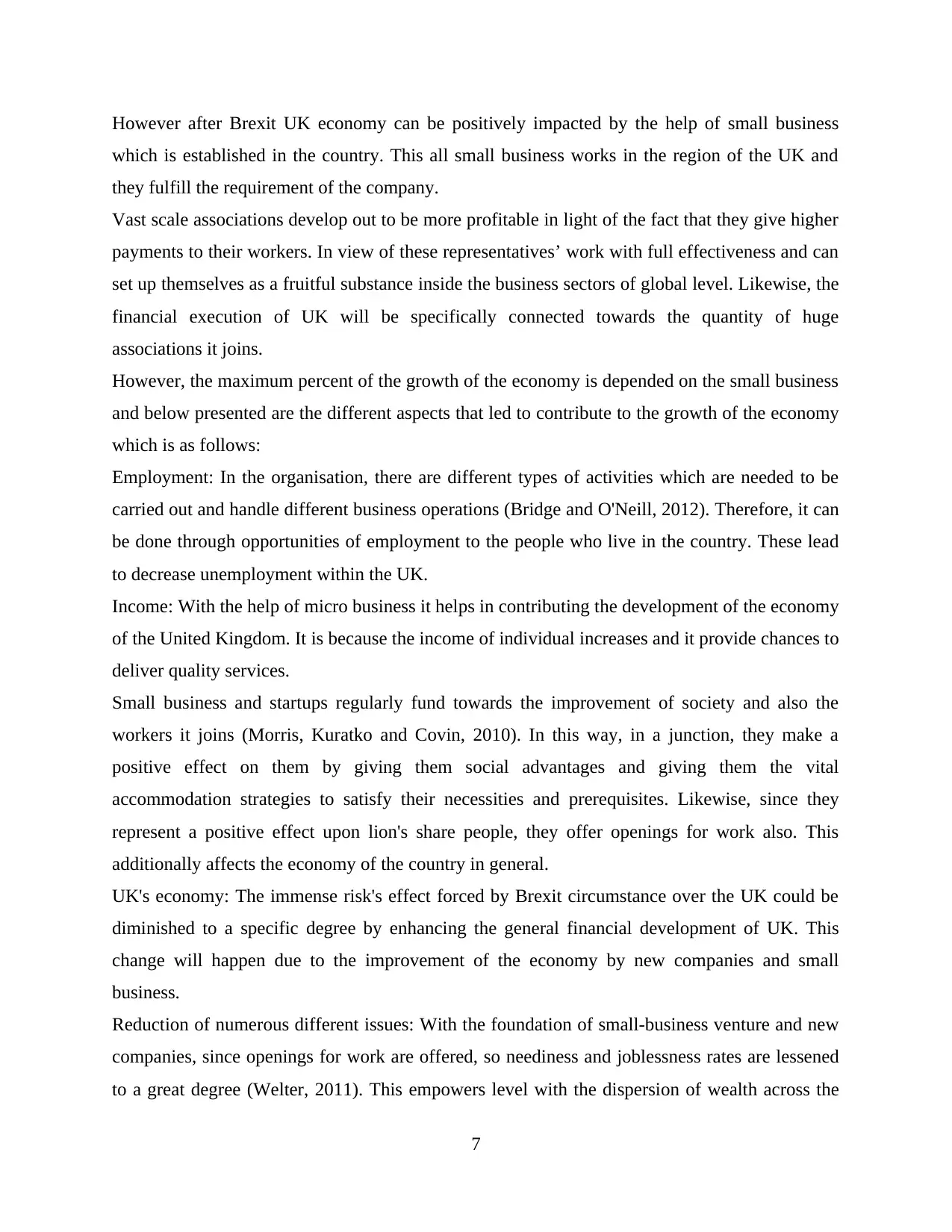
However after Brexit UK economy can be positively impacted by the help of small business
which is established in the country. This all small business works in the region of the UK and
they fulfill the requirement of the company.
Vast scale associations develop out to be more profitable in light of the fact that they give higher
payments to their workers. In view of these representatives’ work with full effectiveness and can
set up themselves as a fruitful substance inside the business sectors of global level. Likewise, the
financial execution of UK will be specifically connected towards the quantity of huge
associations it joins.
However, the maximum percent of the growth of the economy is depended on the small business
and below presented are the different aspects that led to contribute to the growth of the economy
which is as follows:
Employment: In the organisation, there are different types of activities which are needed to be
carried out and handle different business operations (Bridge and O'Neill, 2012). Therefore, it can
be done through opportunities of employment to the people who live in the country. These lead
to decrease unemployment within the UK.
Income: With the help of micro business it helps in contributing the development of the economy
of the United Kingdom. It is because the income of individual increases and it provide chances to
deliver quality services.
Small business and startups regularly fund towards the improvement of society and also the
workers it joins (Morris, Kuratko and Covin, 2010). In this way, in a junction, they make a
positive effect on them by giving them social advantages and giving them the vital
accommodation strategies to satisfy their necessities and prerequisites. Likewise, since they
represent a positive effect upon lion's share people, they offer openings for work also. This
additionally affects the economy of the country in general.
UK's economy: The immense risk's effect forced by Brexit circumstance over the UK could be
diminished to a specific degree by enhancing the general financial development of UK. This
change will happen due to the improvement of the economy by new companies and small
business.
Reduction of numerous different issues: With the foundation of small-business venture and new
companies, since openings for work are offered, so neediness and joblessness rates are lessened
to a great degree (Welter, 2011). This empowers level with the dispersion of wealth across the
7
which is established in the country. This all small business works in the region of the UK and
they fulfill the requirement of the company.
Vast scale associations develop out to be more profitable in light of the fact that they give higher
payments to their workers. In view of these representatives’ work with full effectiveness and can
set up themselves as a fruitful substance inside the business sectors of global level. Likewise, the
financial execution of UK will be specifically connected towards the quantity of huge
associations it joins.
However, the maximum percent of the growth of the economy is depended on the small business
and below presented are the different aspects that led to contribute to the growth of the economy
which is as follows:
Employment: In the organisation, there are different types of activities which are needed to be
carried out and handle different business operations (Bridge and O'Neill, 2012). Therefore, it can
be done through opportunities of employment to the people who live in the country. These lead
to decrease unemployment within the UK.
Income: With the help of micro business it helps in contributing the development of the economy
of the United Kingdom. It is because the income of individual increases and it provide chances to
deliver quality services.
Small business and startups regularly fund towards the improvement of society and also the
workers it joins (Morris, Kuratko and Covin, 2010). In this way, in a junction, they make a
positive effect on them by giving them social advantages and giving them the vital
accommodation strategies to satisfy their necessities and prerequisites. Likewise, since they
represent a positive effect upon lion's share people, they offer openings for work also. This
additionally affects the economy of the country in general.
UK's economy: The immense risk's effect forced by Brexit circumstance over the UK could be
diminished to a specific degree by enhancing the general financial development of UK. This
change will happen due to the improvement of the economy by new companies and small
business.
Reduction of numerous different issues: With the foundation of small-business venture and new
companies, since openings for work are offered, so neediness and joblessness rates are lessened
to a great degree (Welter, 2011). This empowers level with the dispersion of wealth across the
7
Paraphrase This Document
Need a fresh take? Get an instant paraphrase of this document with our AI Paraphraser
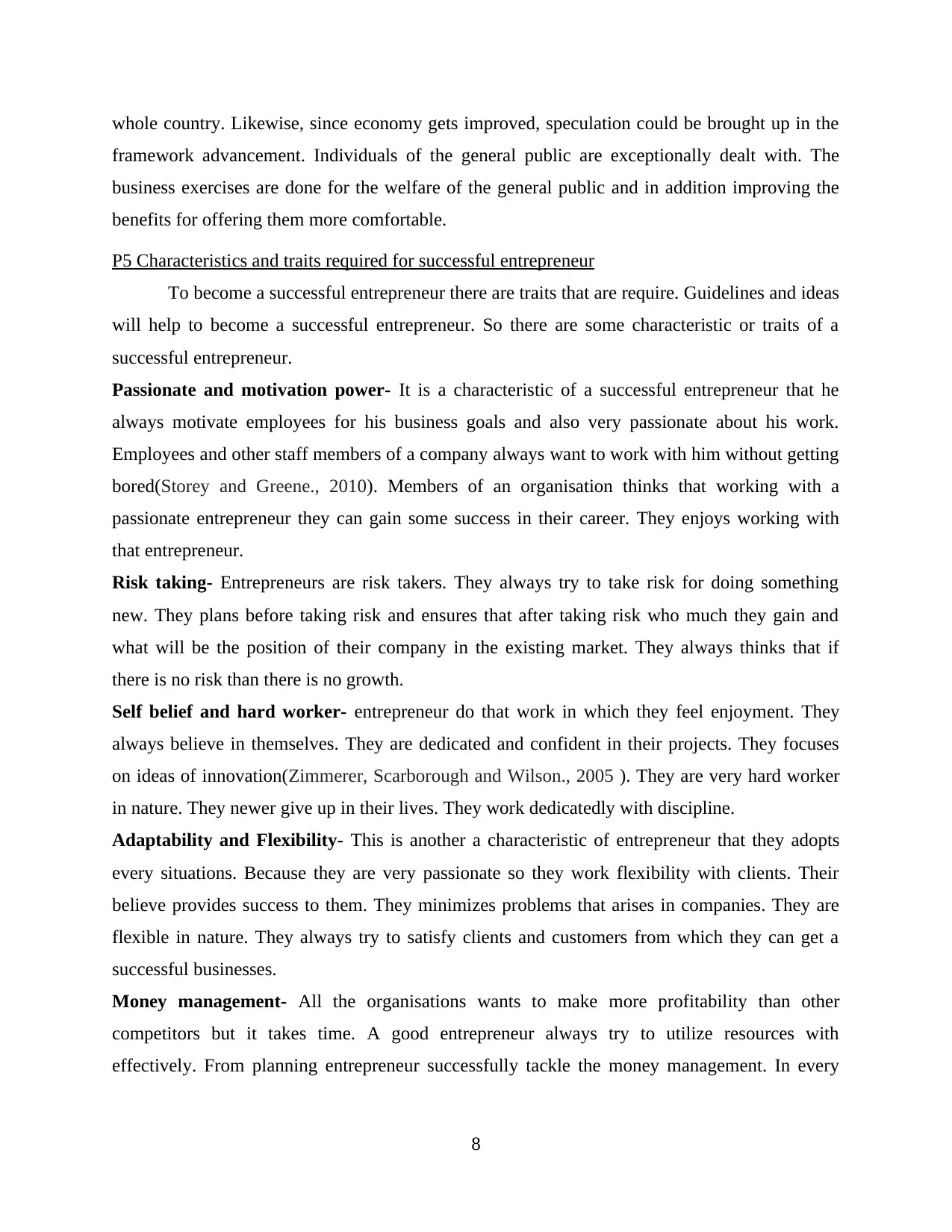
whole country. Likewise, since economy gets improved, speculation could be brought up in the
framework advancement. Individuals of the general public are exceptionally dealt with. The
business exercises are done for the welfare of the general public and in addition improving the
benefits for offering them more comfortable.
P5 Characteristics and traits required for successful entrepreneur
To become a successful entrepreneur there are traits that are require. Guidelines and ideas
will help to become a successful entrepreneur. So there are some characteristic or traits of a
successful entrepreneur.
Passionate and motivation power- It is a characteristic of a successful entrepreneur that he
always motivate employees for his business goals and also very passionate about his work.
Employees and other staff members of a company always want to work with him without getting
bored(Storey and Greene., 2010). Members of an organisation thinks that working with a
passionate entrepreneur they can gain some success in their career. They enjoys working with
that entrepreneur.
Risk taking- Entrepreneurs are risk takers. They always try to take risk for doing something
new. They plans before taking risk and ensures that after taking risk who much they gain and
what will be the position of their company in the existing market. They always thinks that if
there is no risk than there is no growth.
Self belief and hard worker- entrepreneur do that work in which they feel enjoyment. They
always believe in themselves. They are dedicated and confident in their projects. They focuses
on ideas of innovation(Zimmerer, Scarborough and Wilson., 2005 ). They are very hard worker
in nature. They newer give up in their lives. They work dedicatedly with discipline.
Adaptability and Flexibility- This is another a characteristic of entrepreneur that they adopts
every situations. Because they are very passionate so they work flexibility with clients. Their
believe provides success to them. They minimizes problems that arises in companies. They are
flexible in nature. They always try to satisfy clients and customers from which they can get a
successful businesses.
Money management- All the organisations wants to make more profitability than other
competitors but it takes time. A good entrepreneur always try to utilize resources with
effectively. From planning entrepreneur successfully tackle the money management. In every
8
framework advancement. Individuals of the general public are exceptionally dealt with. The
business exercises are done for the welfare of the general public and in addition improving the
benefits for offering them more comfortable.
P5 Characteristics and traits required for successful entrepreneur
To become a successful entrepreneur there are traits that are require. Guidelines and ideas
will help to become a successful entrepreneur. So there are some characteristic or traits of a
successful entrepreneur.
Passionate and motivation power- It is a characteristic of a successful entrepreneur that he
always motivate employees for his business goals and also very passionate about his work.
Employees and other staff members of a company always want to work with him without getting
bored(Storey and Greene., 2010). Members of an organisation thinks that working with a
passionate entrepreneur they can gain some success in their career. They enjoys working with
that entrepreneur.
Risk taking- Entrepreneurs are risk takers. They always try to take risk for doing something
new. They plans before taking risk and ensures that after taking risk who much they gain and
what will be the position of their company in the existing market. They always thinks that if
there is no risk than there is no growth.
Self belief and hard worker- entrepreneur do that work in which they feel enjoyment. They
always believe in themselves. They are dedicated and confident in their projects. They focuses
on ideas of innovation(Zimmerer, Scarborough and Wilson., 2005 ). They are very hard worker
in nature. They newer give up in their lives. They work dedicatedly with discipline.
Adaptability and Flexibility- This is another a characteristic of entrepreneur that they adopts
every situations. Because they are very passionate so they work flexibility with clients. Their
believe provides success to them. They minimizes problems that arises in companies. They are
flexible in nature. They always try to satisfy clients and customers from which they can get a
successful businesses.
Money management- All the organisations wants to make more profitability than other
competitors but it takes time. A good entrepreneur always try to utilize resources with
effectively. From planning entrepreneur successfully tackle the money management. In every
8
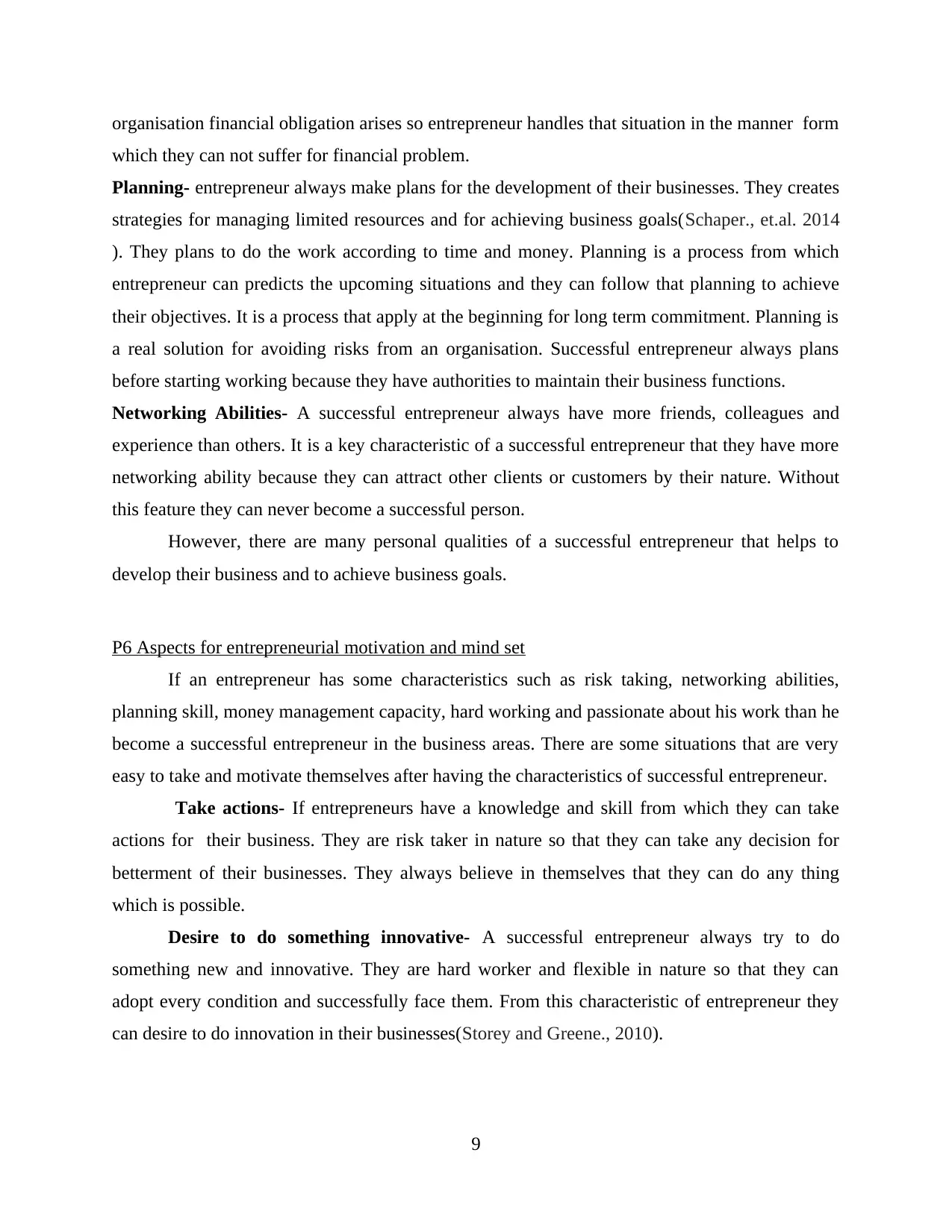
organisation financial obligation arises so entrepreneur handles that situation in the manner form
which they can not suffer for financial problem.
Planning- entrepreneur always make plans for the development of their businesses. They creates
strategies for managing limited resources and for achieving business goals(Schaper., et.al. 2014
). They plans to do the work according to time and money. Planning is a process from which
entrepreneur can predicts the upcoming situations and they can follow that planning to achieve
their objectives. It is a process that apply at the beginning for long term commitment. Planning is
a real solution for avoiding risks from an organisation. Successful entrepreneur always plans
before starting working because they have authorities to maintain their business functions.
Networking Abilities- A successful entrepreneur always have more friends, colleagues and
experience than others. It is a key characteristic of a successful entrepreneur that they have more
networking ability because they can attract other clients or customers by their nature. Without
this feature they can never become a successful person.
However, there are many personal qualities of a successful entrepreneur that helps to
develop their business and to achieve business goals.
P6 Aspects for entrepreneurial motivation and mind set
If an entrepreneur has some characteristics such as risk taking, networking abilities,
planning skill, money management capacity, hard working and passionate about his work than he
become a successful entrepreneur in the business areas. There are some situations that are very
easy to take and motivate themselves after having the characteristics of successful entrepreneur.
Take actions- If entrepreneurs have a knowledge and skill from which they can take
actions for their business. They are risk taker in nature so that they can take any decision for
betterment of their businesses. They always believe in themselves that they can do any thing
which is possible.
Desire to do something innovative- A successful entrepreneur always try to do
something new and innovative. They are hard worker and flexible in nature so that they can
adopt every condition and successfully face them. From this characteristic of entrepreneur they
can desire to do innovation in their businesses(Storey and Greene., 2010).
9
which they can not suffer for financial problem.
Planning- entrepreneur always make plans for the development of their businesses. They creates
strategies for managing limited resources and for achieving business goals(Schaper., et.al. 2014
). They plans to do the work according to time and money. Planning is a process from which
entrepreneur can predicts the upcoming situations and they can follow that planning to achieve
their objectives. It is a process that apply at the beginning for long term commitment. Planning is
a real solution for avoiding risks from an organisation. Successful entrepreneur always plans
before starting working because they have authorities to maintain their business functions.
Networking Abilities- A successful entrepreneur always have more friends, colleagues and
experience than others. It is a key characteristic of a successful entrepreneur that they have more
networking ability because they can attract other clients or customers by their nature. Without
this feature they can never become a successful person.
However, there are many personal qualities of a successful entrepreneur that helps to
develop their business and to achieve business goals.
P6 Aspects for entrepreneurial motivation and mind set
If an entrepreneur has some characteristics such as risk taking, networking abilities,
planning skill, money management capacity, hard working and passionate about his work than he
become a successful entrepreneur in the business areas. There are some situations that are very
easy to take and motivate themselves after having the characteristics of successful entrepreneur.
Take actions- If entrepreneurs have a knowledge and skill from which they can take
actions for their business. They are risk taker in nature so that they can take any decision for
betterment of their businesses. They always believe in themselves that they can do any thing
which is possible.
Desire to do something innovative- A successful entrepreneur always try to do
something new and innovative. They are hard worker and flexible in nature so that they can
adopt every condition and successfully face them. From this characteristic of entrepreneur they
can desire to do innovation in their businesses(Storey and Greene., 2010).
9
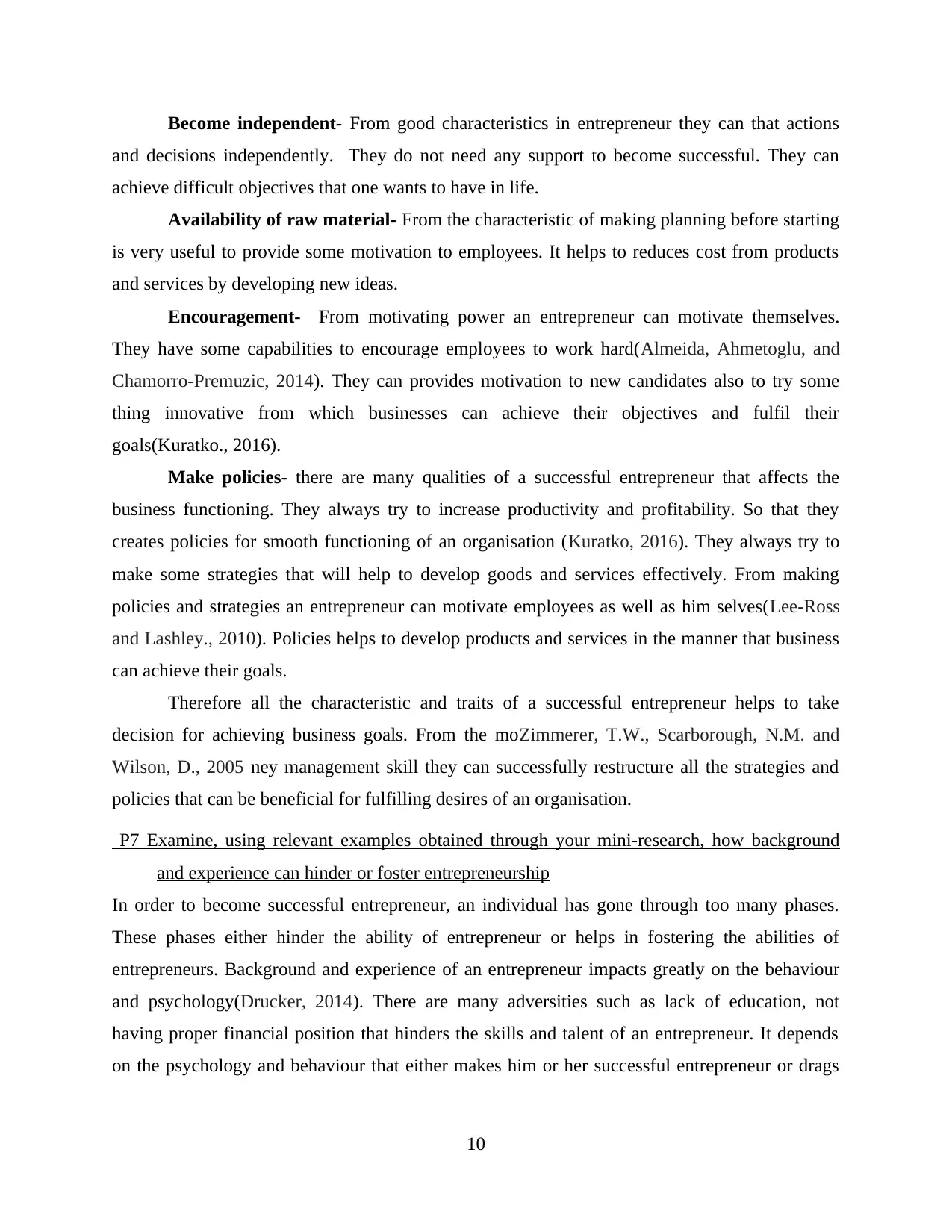
Become independent- From good characteristics in entrepreneur they can that actions
and decisions independently. They do not need any support to become successful. They can
achieve difficult objectives that one wants to have in life.
Availability of raw material- From the characteristic of making planning before starting
is very useful to provide some motivation to employees. It helps to reduces cost from products
and services by developing new ideas.
Encouragement- From motivating power an entrepreneur can motivate themselves.
They have some capabilities to encourage employees to work hard(Almeida, Ahmetoglu, and
Chamorro-Premuzic, 2014). They can provides motivation to new candidates also to try some
thing innovative from which businesses can achieve their objectives and fulfil their
goals(Kuratko., 2016).
Make policies- there are many qualities of a successful entrepreneur that affects the
business functioning. They always try to increase productivity and profitability. So that they
creates policies for smooth functioning of an organisation (Kuratko, 2016). They always try to
make some strategies that will help to develop goods and services effectively. From making
policies and strategies an entrepreneur can motivate employees as well as him selves(Lee-Ross
and Lashley., 2010). Policies helps to develop products and services in the manner that business
can achieve their goals.
Therefore all the characteristic and traits of a successful entrepreneur helps to take
decision for achieving business goals. From the moZimmerer, T.W., Scarborough, N.M. and
Wilson, D., 2005 ney management skill they can successfully restructure all the strategies and
policies that can be beneficial for fulfilling desires of an organisation.
P7 Examine, using relevant examples obtained through your mini-research, how background
and experience can hinder or foster entrepreneurship
In order to become successful entrepreneur, an individual has gone through too many phases.
These phases either hinder the ability of entrepreneur or helps in fostering the abilities of
entrepreneurs. Background and experience of an entrepreneur impacts greatly on the behaviour
and psychology(Drucker, 2014). There are many adversities such as lack of education, not
having proper financial position that hinders the skills and talent of an entrepreneur. It depends
on the psychology and behaviour that either makes him or her successful entrepreneur or drags
10
and decisions independently. They do not need any support to become successful. They can
achieve difficult objectives that one wants to have in life.
Availability of raw material- From the characteristic of making planning before starting
is very useful to provide some motivation to employees. It helps to reduces cost from products
and services by developing new ideas.
Encouragement- From motivating power an entrepreneur can motivate themselves.
They have some capabilities to encourage employees to work hard(Almeida, Ahmetoglu, and
Chamorro-Premuzic, 2014). They can provides motivation to new candidates also to try some
thing innovative from which businesses can achieve their objectives and fulfil their
goals(Kuratko., 2016).
Make policies- there are many qualities of a successful entrepreneur that affects the
business functioning. They always try to increase productivity and profitability. So that they
creates policies for smooth functioning of an organisation (Kuratko, 2016). They always try to
make some strategies that will help to develop goods and services effectively. From making
policies and strategies an entrepreneur can motivate employees as well as him selves(Lee-Ross
and Lashley., 2010). Policies helps to develop products and services in the manner that business
can achieve their goals.
Therefore all the characteristic and traits of a successful entrepreneur helps to take
decision for achieving business goals. From the moZimmerer, T.W., Scarborough, N.M. and
Wilson, D., 2005 ney management skill they can successfully restructure all the strategies and
policies that can be beneficial for fulfilling desires of an organisation.
P7 Examine, using relevant examples obtained through your mini-research, how background
and experience can hinder or foster entrepreneurship
In order to become successful entrepreneur, an individual has gone through too many phases.
These phases either hinder the ability of entrepreneur or helps in fostering the abilities of
entrepreneurs. Background and experience of an entrepreneur impacts greatly on the behaviour
and psychology(Drucker, 2014). There are many adversities such as lack of education, not
having proper financial position that hinders the skills and talent of an entrepreneur. It depends
on the psychology and behaviour that either makes him or her successful entrepreneur or drags
10
Secure Best Marks with AI Grader
Need help grading? Try our AI Grader for instant feedback on your assignments.
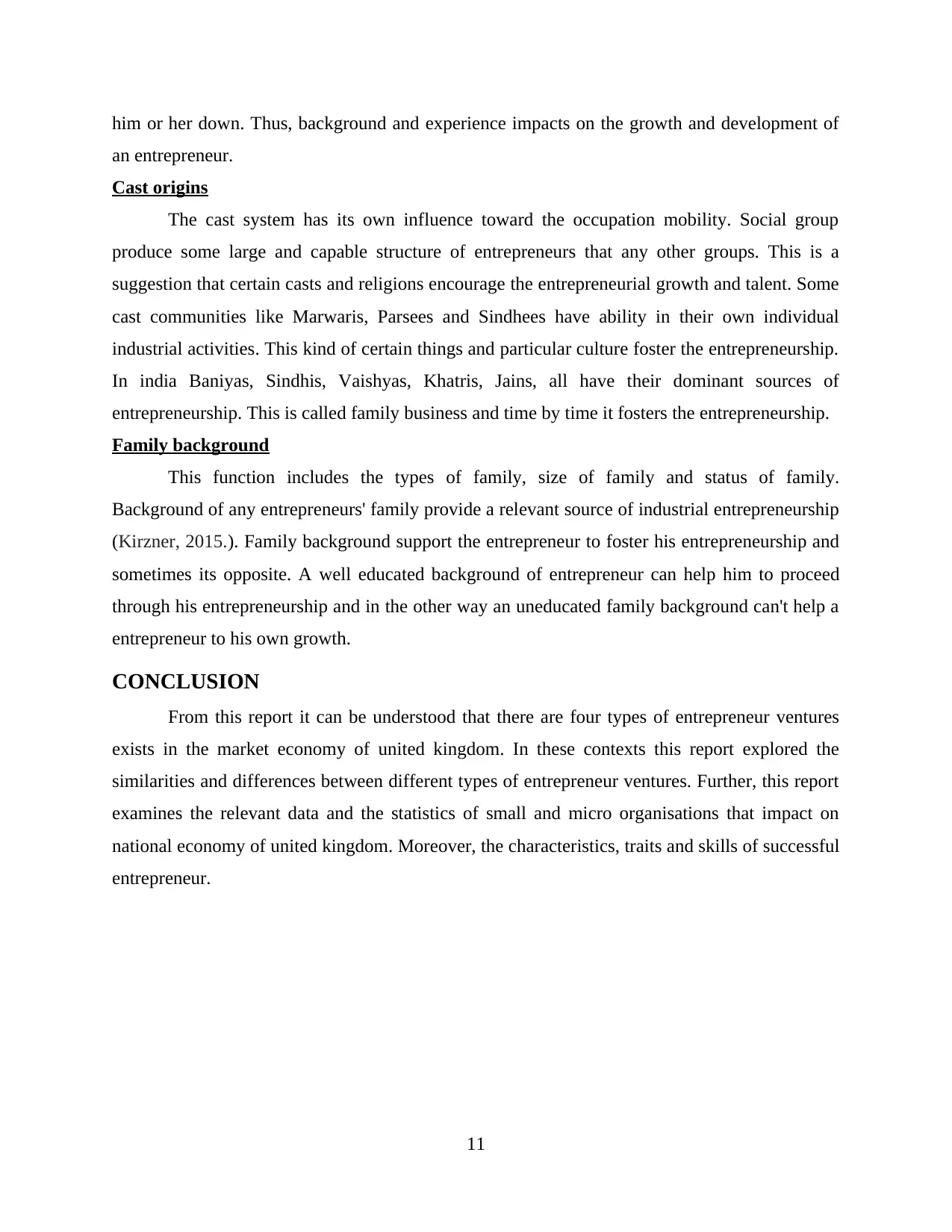
him or her down. Thus, background and experience impacts on the growth and development of
an entrepreneur.
Cast origins
The cast system has its own influence toward the occupation mobility. Social group
produce some large and capable structure of entrepreneurs that any other groups. This is a
suggestion that certain casts and religions encourage the entrepreneurial growth and talent. Some
cast communities like Marwaris, Parsees and Sindhees have ability in their own individual
industrial activities. This kind of certain things and particular culture foster the entrepreneurship.
In india Baniyas, Sindhis, Vaishyas, Khatris, Jains, all have their dominant sources of
entrepreneurship. This is called family business and time by time it fosters the entrepreneurship.
Family background
This function includes the types of family, size of family and status of family.
Background of any entrepreneurs' family provide a relevant source of industrial entrepreneurship
(Kirzner, 2015.). Family background support the entrepreneur to foster his entrepreneurship and
sometimes its opposite. A well educated background of entrepreneur can help him to proceed
through his entrepreneurship and in the other way an uneducated family background can't help a
entrepreneur to his own growth.
CONCLUSION
From this report it can be understood that there are four types of entrepreneur ventures
exists in the market economy of united kingdom. In these contexts this report explored the
similarities and differences between different types of entrepreneur ventures. Further, this report
examines the relevant data and the statistics of small and micro organisations that impact on
national economy of united kingdom. Moreover, the characteristics, traits and skills of successful
entrepreneur.
11
an entrepreneur.
Cast origins
The cast system has its own influence toward the occupation mobility. Social group
produce some large and capable structure of entrepreneurs that any other groups. This is a
suggestion that certain casts and religions encourage the entrepreneurial growth and talent. Some
cast communities like Marwaris, Parsees and Sindhees have ability in their own individual
industrial activities. This kind of certain things and particular culture foster the entrepreneurship.
In india Baniyas, Sindhis, Vaishyas, Khatris, Jains, all have their dominant sources of
entrepreneurship. This is called family business and time by time it fosters the entrepreneurship.
Family background
This function includes the types of family, size of family and status of family.
Background of any entrepreneurs' family provide a relevant source of industrial entrepreneurship
(Kirzner, 2015.). Family background support the entrepreneur to foster his entrepreneurship and
sometimes its opposite. A well educated background of entrepreneur can help him to proceed
through his entrepreneurship and in the other way an uneducated family background can't help a
entrepreneur to his own growth.
CONCLUSION
From this report it can be understood that there are four types of entrepreneur ventures
exists in the market economy of united kingdom. In these contexts this report explored the
similarities and differences between different types of entrepreneur ventures. Further, this report
examines the relevant data and the statistics of small and micro organisations that impact on
national economy of united kingdom. Moreover, the characteristics, traits and skills of successful
entrepreneur.
11
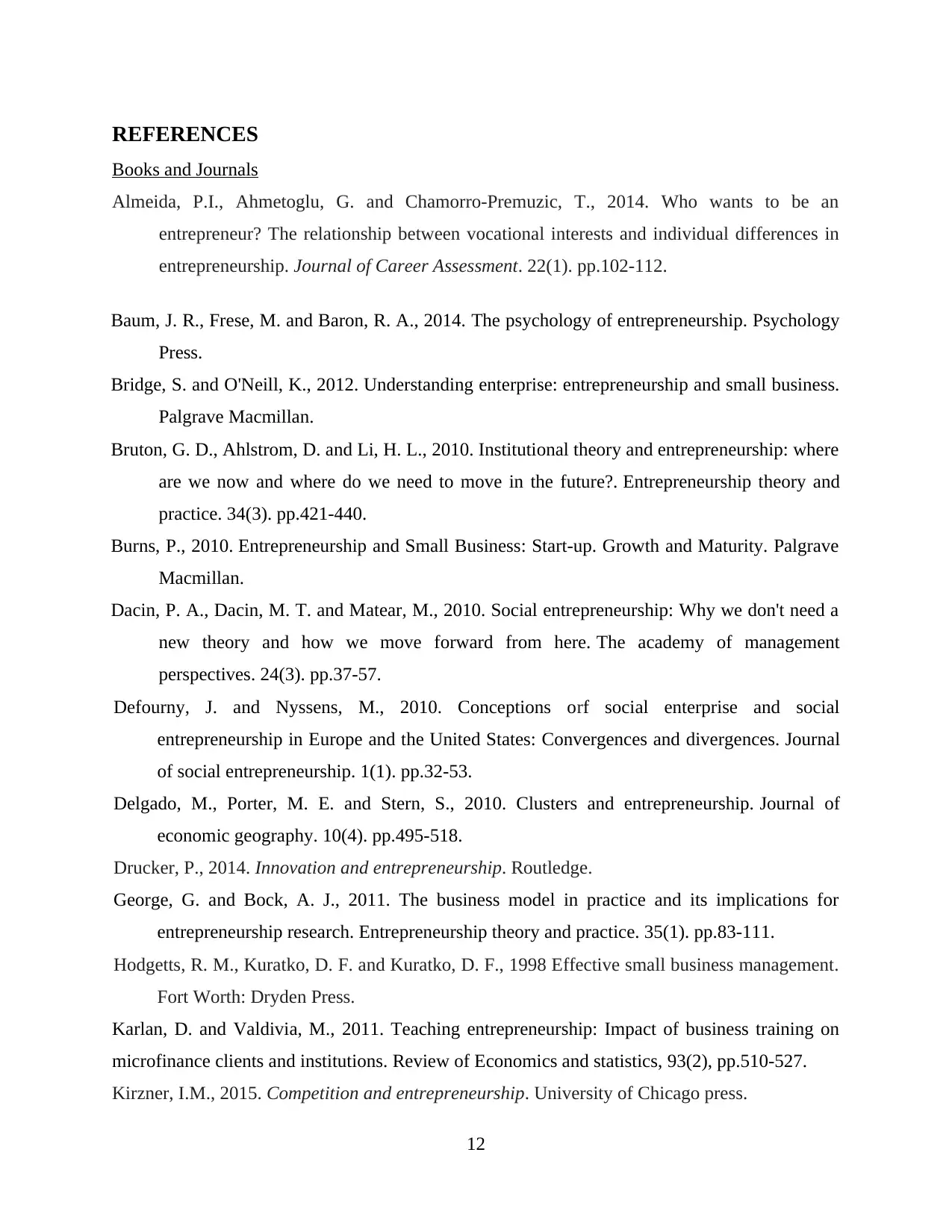
REFERENCES
Books and Journals
Almeida, P.I., Ahmetoglu, G. and Chamorro-Premuzic, T., 2014. Who wants to be an
entrepreneur? The relationship between vocational interests and individual differences in
entrepreneurship. Journal of Career Assessment. 22(1). pp.102-112.
Baum, J. R., Frese, M. and Baron, R. A., 2014. The psychology of entrepreneurship. Psychology
Press.
Bridge, S. and O'Neill, K., 2012. Understanding enterprise: entrepreneurship and small business.
Palgrave Macmillan.
Bruton, G. D., Ahlstrom, D. and Li, H. L., 2010. Institutional theory and entrepreneurship: where
are we now and where do we need to move in the future?. Entrepreneurship theory and
practice. 34(3). pp.421-440.
Burns, P., 2010. Entrepreneurship and Small Business: Start-up. Growth and Maturity. Palgrave
Macmillan.
Dacin, P. A., Dacin, M. T. and Matear, M., 2010. Social entrepreneurship: Why we don't need a
new theory and how we move forward from here. The academy of management
perspectives. 24(3). pp.37-57.
Defourny, J. and Nyssens, M., 2010. Conceptions orf social enterprise and social
entrepreneurship in Europe and the United States: Convergences and divergences. Journal
of social entrepreneurship. 1(1). pp.32-53.
Delgado, M., Porter, M. E. and Stern, S., 2010. Clusters and entrepreneurship. Journal of
economic geography. 10(4). pp.495-518.
Drucker, P., 2014. Innovation and entrepreneurship. Routledge.
George, G. and Bock, A. J., 2011. The business model in practice and its implications for
entrepreneurship research. Entrepreneurship theory and practice. 35(1). pp.83-111.
Hodgetts, R. M., Kuratko, D. F. and Kuratko, D. F., 1998 Effective small business management.
Fort Worth: Dryden Press.
Karlan, D. and Valdivia, M., 2011. Teaching entrepreneurship: Impact of business training on
microfinance clients and institutions. Review of Economics and statistics, 93(2), pp.510-527.
Kirzner, I.M., 2015. Competition and entrepreneurship. University of Chicago press.
12
Books and Journals
Almeida, P.I., Ahmetoglu, G. and Chamorro-Premuzic, T., 2014. Who wants to be an
entrepreneur? The relationship between vocational interests and individual differences in
entrepreneurship. Journal of Career Assessment. 22(1). pp.102-112.
Baum, J. R., Frese, M. and Baron, R. A., 2014. The psychology of entrepreneurship. Psychology
Press.
Bridge, S. and O'Neill, K., 2012. Understanding enterprise: entrepreneurship and small business.
Palgrave Macmillan.
Bruton, G. D., Ahlstrom, D. and Li, H. L., 2010. Institutional theory and entrepreneurship: where
are we now and where do we need to move in the future?. Entrepreneurship theory and
practice. 34(3). pp.421-440.
Burns, P., 2010. Entrepreneurship and Small Business: Start-up. Growth and Maturity. Palgrave
Macmillan.
Dacin, P. A., Dacin, M. T. and Matear, M., 2010. Social entrepreneurship: Why we don't need a
new theory and how we move forward from here. The academy of management
perspectives. 24(3). pp.37-57.
Defourny, J. and Nyssens, M., 2010. Conceptions orf social enterprise and social
entrepreneurship in Europe and the United States: Convergences and divergences. Journal
of social entrepreneurship. 1(1). pp.32-53.
Delgado, M., Porter, M. E. and Stern, S., 2010. Clusters and entrepreneurship. Journal of
economic geography. 10(4). pp.495-518.
Drucker, P., 2014. Innovation and entrepreneurship. Routledge.
George, G. and Bock, A. J., 2011. The business model in practice and its implications for
entrepreneurship research. Entrepreneurship theory and practice. 35(1). pp.83-111.
Hodgetts, R. M., Kuratko, D. F. and Kuratko, D. F., 1998 Effective small business management.
Fort Worth: Dryden Press.
Karlan, D. and Valdivia, M., 2011. Teaching entrepreneurship: Impact of business training on
microfinance clients and institutions. Review of Economics and statistics, 93(2), pp.510-527.
Kirzner, I.M., 2015. Competition and entrepreneurship. University of Chicago press.
12
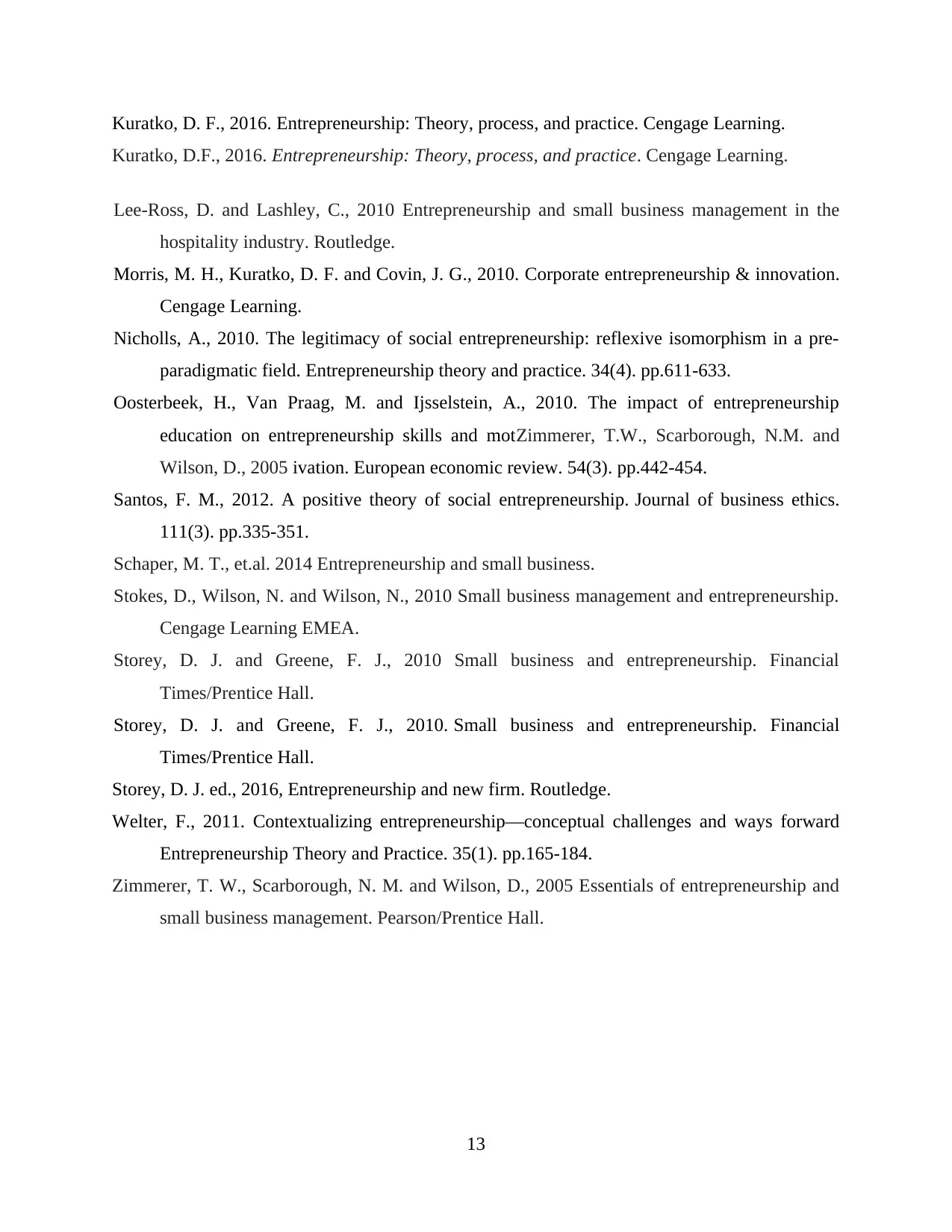
Kuratko, D. F., 2016. Entrepreneurship: Theory, process, and practice. Cengage Learning.
Kuratko, D.F., 2016. Entrepreneurship: Theory, process, and practice. Cengage Learning.
Lee-Ross, D. and Lashley, C., 2010 Entrepreneurship and small business management in the
hospitality industry. Routledge.
Morris, M. H., Kuratko, D. F. and Covin, J. G., 2010. Corporate entrepreneurship & innovation.
Cengage Learning.
Nicholls, A., 2010. The legitimacy of social entrepreneurship: reflexive isomorphism in a pre‐
paradigmatic field. Entrepreneurship theory and practice. 34(4). pp.611-633.
Oosterbeek, H., Van Praag, M. and Ijsselstein, A., 2010. The impact of entrepreneurship
education on entrepreneurship skills and motZimmerer, T.W., Scarborough, N.M. and
Wilson, D., 2005 ivation. European economic review. 54(3). pp.442-454.
Santos, F. M., 2012. A positive theory of social entrepreneurship. Journal of business ethics.
111(3). pp.335-351.
Schaper, M. T., et.al. 2014 Entrepreneurship and small business.
Stokes, D., Wilson, N. and Wilson, N., 2010 Small business management and entrepreneurship.
Cengage Learning EMEA.
Storey, D. J. and Greene, F. J., 2010 Small business and entrepreneurship. Financial
Times/Prentice Hall.
Storey, D. J. and Greene, F. J., 2010. Small business and entrepreneurship. Financial
Times/Prentice Hall.
Storey, D. J. ed., 2016, Entrepreneurship and new firm. Routledge.
Welter, F., 2011. Contextualizing entrepreneurship—conceptual challenges and ways forward
Entrepreneurship Theory and Practice. 35(1). pp.165-184.
Zimmerer, T. W., Scarborough, N. M. and Wilson, D., 2005 Essentials of entrepreneurship and
small business management. Pearson/Prentice Hall.
13
Kuratko, D.F., 2016. Entrepreneurship: Theory, process, and practice. Cengage Learning.
Lee-Ross, D. and Lashley, C., 2010 Entrepreneurship and small business management in the
hospitality industry. Routledge.
Morris, M. H., Kuratko, D. F. and Covin, J. G., 2010. Corporate entrepreneurship & innovation.
Cengage Learning.
Nicholls, A., 2010. The legitimacy of social entrepreneurship: reflexive isomorphism in a pre‐
paradigmatic field. Entrepreneurship theory and practice. 34(4). pp.611-633.
Oosterbeek, H., Van Praag, M. and Ijsselstein, A., 2010. The impact of entrepreneurship
education on entrepreneurship skills and motZimmerer, T.W., Scarborough, N.M. and
Wilson, D., 2005 ivation. European economic review. 54(3). pp.442-454.
Santos, F. M., 2012. A positive theory of social entrepreneurship. Journal of business ethics.
111(3). pp.335-351.
Schaper, M. T., et.al. 2014 Entrepreneurship and small business.
Stokes, D., Wilson, N. and Wilson, N., 2010 Small business management and entrepreneurship.
Cengage Learning EMEA.
Storey, D. J. and Greene, F. J., 2010 Small business and entrepreneurship. Financial
Times/Prentice Hall.
Storey, D. J. and Greene, F. J., 2010. Small business and entrepreneurship. Financial
Times/Prentice Hall.
Storey, D. J. ed., 2016, Entrepreneurship and new firm. Routledge.
Welter, F., 2011. Contextualizing entrepreneurship—conceptual challenges and ways forward
Entrepreneurship Theory and Practice. 35(1). pp.165-184.
Zimmerer, T. W., Scarborough, N. M. and Wilson, D., 2005 Essentials of entrepreneurship and
small business management. Pearson/Prentice Hall.
13
1 out of 13
Related Documents
Your All-in-One AI-Powered Toolkit for Academic Success.
+13062052269
info@desklib.com
Available 24*7 on WhatsApp / Email
![[object Object]](/_next/static/media/star-bottom.7253800d.svg)
Unlock your academic potential
© 2024 | Zucol Services PVT LTD | All rights reserved.





